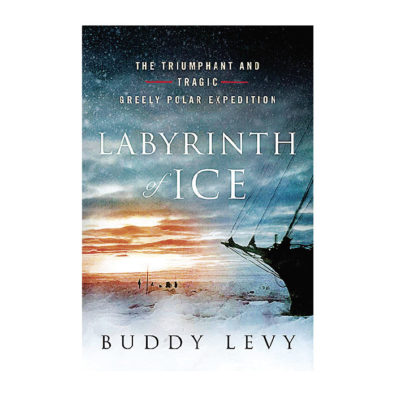Buddy Levy
St. Martin’s Press: 2019
Lt. Adolphus W. Greely, commander of the Lady Franklin Bay Expedition, assessed the situation from the edge of the ice floe upon which he and his men were stranded.
It was dire.
They were adrift on a raft of ice, and it was 11 degrees Fahrenheit—cold for the time of year but not as low as the sub-zero temperatures they regularly experienced during their two years of exploration and data collection, including a new record for farthest north.
But their resupply ships never reached them. Rations were dwindling. And another winter at the top of the world—with no connection to the rest of it—was fast approaching. How long would they be able to ride this floe? Would they find the caches of food left by boats that had come before? Would they perish in the harsh polar climate?
Buddy Levy uses this dramatic moment—and its questions of life or death—as the entry point to his latest offering, a gripping narrative of the ill-fated Lady Franklin Bay Expedition, its successes, and its setbacks. Labyrinth of Ice is an intense and riveting read. Levy writes cinematically, expertly crafting this harrowing true tale and masterfully making history come alive. His thoroughly researched account relies heavily on Greely’s own volumes for direct quotes and devastating—sometimes horrifying—descriptions. Of constant danger. Of rising tensions. Of frostbite, fear, heroism, hunger, bravery, discovery, longing, and loss.
Twenty-five men, mostly soldiers, started Greely’s expedition. They were dropped off in the summer of 1881 more than 1,000 miles north of the Arctic Circle and some 250 miles from the last known settlement. When no one came to collect them or drop off additional provisions as previously planned, Greely retreated south from the refuge of Fort Conger to seek reinforcements and try to connect with rescuers.
Levy balances their travails with the stories of ships that attempted to reach their camp as well as the work of Greely’s wife, Henrietta, who toiled tirelessly to get the government to send another boat. He also includes historical photographs from the expedition, helpful reference maps, and a six-page bibliography.
Levy became interested in the expedition after learning about it during a trip to Greenland in 2003. But he had been fascinated by the Arctic ever since reading Jack London’s works as a boy growing up in Idaho. His Labyrinth of Ice is a haunting page-turner with present-day relevance. Greely and his crew went north as part of the first International Polar Year, a coordinated approach to explore the Arctic by a coalition of countries. Theirs was the most northerly post. Not only did their observations help prepare future expeditions, but the data they collected provide a baseline for today’s scientists studying climate change.
Levy, who’s taught writing at WSU for 31 years, spent two years working on this superbly told, action-packed story of survival. His writing—exciting, extensively researched, and poetic—helps readers feel as if they, too, are experiencing the long winters and harsh landscape, feeling the bone-chilling temperatures, and hearing the howling winds and grinding ice. His engaging account covers the depths of human suffering and lengths men will go to stay alive when they are largely unprotected from the elements, living in a half-collapsed tent, boiling leather, scavenging lichen for some kind of sustenance, and going mad from starvation, scurvy, exposure—or a combination—all for the sake of science.
Web extra
Q&A with Buddy Levy about the art and craft of historical narrative

